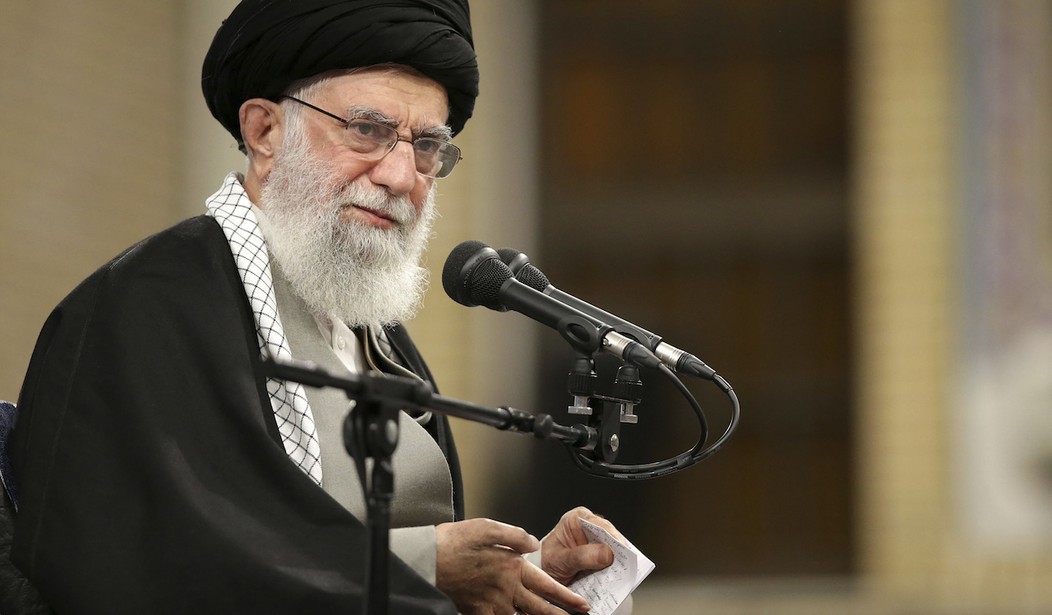Last week, a former CIA director came forward with the idea of a lesser-discussed option. James Woolsey wrote in the National Review that the Iranian regime might already possess the nuclear bomb. Whether or not that assessment is accurate, the piece triggered various conflicting arguments inside the Beltway, but no one disputed that the threat should be addressed sooner rather than later.
In February, the Iranian regime's Intelligence Minister, Mahmoud Alavi, appeared on live state-run television to issue a dire warning to the West. He boasted that the regime would build nuclear weapons if the U.S. and its allies did not lift the sanctions. Whatever one may think of that warning, the international community must respond to ensure that the regime gets a clear message about its intimidation and bullying.
In his interview, Alavi said: "Our nuclear program is peaceful ... but if they push Iran in [the non-peaceful] direction, then it would not be Iran's fault but the fault of those who pushed it in that direction."
Alavi's remarks raised some eyebrows in major capitals, but it did not strike a nerve. There was no worldwide condemnation of, nor any calls on the Iran regime to clarify its stance. The mainstream media did not pay much attention either.
For decades, the Iranian regime has blackmailed its way out of every single international and regional crisis. It blew up the U.S. Marine barracks in Beirut, flattened the AMIA building in Buenos Aires, took hostages from a colorful array of nations, hijacked ships and tankers, slaughtered demonstrators, sniped intellectuals, assassinated dissidents, and the list goes on and on.
No continent has been spared. A 2009 BBC documentary exposed a shocking conversation between the Iranian diplomatic delegation with their European counterparts. They bluntly said: “Let us build our nuclear program, and we will not kill your soldiers in Iraq."
Recommended
Tasnim, a website affiliated with the IRGC's notorious Quds Force, rushed to whitewash Alavi's comments, claiming that he was not talking on behalf of the Supreme Leader Ali Khamenei. However, another state-run website Tabnak suggested that it “might” reflect the strategic thinking of the Iranian regime's leadership, pointing to the concept of nuclear deterrence.
Another important factor was the new tone of the regime's apologists in Washington. Frustrated of the Biden administration's decision not to rush back to the nuclear deal, they blamed the U.S. prudence for Alavi's comments.
The very fact that the intelligence chief, who reports directly to Khamenei and Hassan Rouhani, made those statements leaves little room for interpretation. To date, no official speaker of the Iranian regime has denounced or even downplayed Alavi’s remarks.
The regime claims that Khamenei has issued a religious fatwa forbidding making or using nuclear weapons. However, any serious analyst knows about the mullahs' concept of Taqiya (deliberately lying for expediency). No one has seen the fatwa, and even the supposed date of it was highly suspect, coming long after the NCRI exposed the regime's clandestine nuclear program in 2002.
Even though President Barack Obama and Secretary of State John Kerry put their faith in the fatwa and although the JCPOA was merely built on trust on the West's part, everyone knew that this was more a political rather than a religious matter. The Supreme Leader also revealed his mindset on his website. A piece titled 'Four narratives of the experience of the cost of compromise,' published on June 7, 2017, reads:
"Reconciling with the West in the hopes of lifting the sanctions, he [former Libyan leader Muammar Gaddafi] not only failed to achieve his goal but paid billions of dollars in compensation and destroyed his nuclear and ballistic missile program. Many years later, there was nothing left from Muammar Gaddafi".
Lacking legitimacy inside Iran, the mullahs have resorted to domestic suppression, and the nuclear program is supposed to give them the international 'hands-off' status they desperately need. Unlike North Korea, however, the Iranian regime will not be contained within its borders. Therefore, the international community can ill-afford to remain silent or sit idle vis-à-vis the regime's belligerent posture.
Before the nuclear deal, six U.N. Security Council resolutions brought the regime to its knees, forcing it to negotiate. To achieve leverage in dealing with Tehran, one must point to some of its most brazen acts of terrorism on Western soil.
During the investigations of Assadollah Assadi, an Iranian diplomat whom a Belgian court convicted in February 2021 for masterminding a foiled bomb plot in Paris, European intelligence services learned about his green book that contained the names of dozens of MOIS agents and spies active across the continent.
There have been many calls on the U.S. and its E.U. allies to investigate the regime's lobbies and those who try to influence policymakers and manipulate public opinion in the regime's favor. By investigating and holding these individuals accountable, the West will make it clear to the cunning mullahs that it will no longer be extorted or pushed around by a terrorist regime. They might have appeased them in the past, but all signals coming out of Iran, especially the Supreme Leader's latest remarks during his Nowruz address, show that it is now time to hold the regime to account for its rogue behavior.
























Join the conversation as a VIP Member